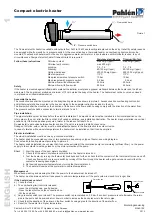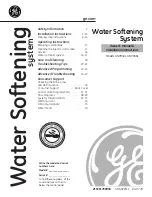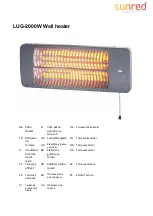
RESIDENTIAL GAS AND ELECTRIC WATER HEATER
SERVICE HANDBOOK
A.O. Smith Water Products Company
Training Department
©
2002
Ashland City, Tennessee
48
WHY WATER HEATER TANKS LEAK -
Continued
WATER CONDITIONS
WHAT
WHY
PREVENTION
“Hard” Water
(Gas Water
Heaters)
“Hard” water contains minerals.
As water is heated the minerals
separate from the water and
attach to hot surfaces within the
tank. In gas water heaters, these
minerals “insulate” the heat
transfer surfaces conducting heat
from the burner through to the
water. These surfaces become
hotter than if they were clean.
Hotter surfaces mean more
expansion and contraction of the
metal as the burner cycles on and
off. The metal or weld joints
crack.
“Flush” the sand from the tank every 6
months.
Delime the tank interior yearly.
Install a water softener in hard water
areas. These should be adjusted
according to manufacturer’s
recommendations, typically for 5 grains
hardness.
“Hard” Water
(Electric Water
Heaters)
See above explanation.
Lime (calcium) forms on the
electric elements.
Elements become excessively hot
and may split.
Split elements often leak to the
outside of the heater.
Inspect and clean elements as
necessary.
Add a water softener.
Install elements resistant to failure due to
Lime (mineral) build up.
Water
Temperature
Water stored at 160
°
F (72
°
C)
may be twice as corrosive as
water stored at 140
°
F (60
°
C)
Begin with a water heater setting of
120
°
F (49
°
C) and increase only as
necessary.
Usage
Each time the burner or elements
cycle on and off, a small amount
of metal expansion and
contraction take place. As
bending a piece of wire back and
forth will break the wire, this
expansion and contraction will
eventually crack tank joints or
welds.
Purchasing a proper sized tank will
minimize burner or element operation
when only small quantities of hot water
are used.
For more detailed explanation on this information as well as additional service information, see
the A.O. Smith Web site
www.hotwater.com
under “Technical Information”.
0801
form TC-063













































